The Quest for World Peace Reading List

|
The End of Poverty by Jeffrey SachsIf you are crusading for a better world, or indeed the ultimate goal of world peace itself, this book is absolutely indispensible from your reading list. Sachs, a Harvard economist who is, quite by chance, sucked into the struggle faced by the poorer countries of the world. Thoroughly readable, he tells many remarkable stories of his work in Bolivia and Poland as well as his perspective and diagnosis of many of the problems that developing countries face. He also tells of his unique perspective as a person in a very developed country frustrated by the obstacles that even a person of his authority faces in his attempts at achieving his aims. Most importantly, at least for me, he offers a great deal of hope. Sachs now heads the Earth Institute at Columbia University (I'm not biased... no, really) and was instrumental in formulating the UN's Millenium Development goals. An excellent book to start anyone off on their quest for world peace, Sachs lends great credibility to something of an incredible goal. |

|
Development as Freedom by Amartya SenThe book arose out of a series of seminars which were given by Sen to the World Bank. This means that the language is very easy to understand and highly technical concepts are carefully explained so as not to confuse the less-educated layman. This book is canon in the literature on human rights studies (and if it isn't, it definitely should be) and was pioneering at the time of its publishing because it presented an expanded and more comprehensive framework from which to view human rights in the world. My reading of this book is timely as Amnesty International begins to look more deeply into the problems of economic social and cultural rights. A background in philosophy (like and undergraduate major... for example) will enrich your reading of this book considerably, though it is not essential to capture the essence of what Sen is trying to say. Sen is also the winner of the 1998 Nobel prize in economics. |

|
Freedom from Fear by Aung San Suu KyiA personal favourite of mine for reasons too numerous to list here. Aung San Suu Kyi (pronounced Ong san sue cheee) writes very well, as most Oxford-educated people tend to. She tells the extraordinary story of the people of Burma with great authority, not just as a scholar, not just as a Burmese, but as the person who is at the very centre of explosive melting pot of issues which surround Burma to this day. The winner of the 1991 Nobel prize for peace, she is still under house arrest. Her unique perspective is insightful and her narrative carries the same authority as Winston Churchill's "History of World War II" and for simialr reasons. The book gives a history lesson, a politics lesson and a life lesson, and one which everyone can benefit from. The foreward by her late husband Michael Aris is moving and deeply saddening at its heart. I've read this book a dozen times and I always come away invigorated because it reminds me of the urgency and importance of the work that I do (in my quest for world peace). |

|
Institutions, Institutional Change and Economic Performance by Douglass NorthThis is the greatest evidence that exists for the saying "Don't judge a book by it's cover". Perhaps the cover appeals to economists, but it didn't exactly raise my hopes when I picked it up to do the necessary background research for my paper on the title's topic. The book is not easy to read either, being dense and not particularly well-written. That is not to say that it is as impenetrable as say, Rorty or Derrida, far from it, but his style of writing is aimed more at a reader who is somewhat familiar with the concepts he discusses and I certainly wouldn't recommend this as a first book on development or economics. The material covered, however, is brilliant. Many ideas that I was developing in my mind, which I had thought were rather radical and original, were presented in this book and developed very well. This was very heartening because I was beginning to think that economics was a rather trifling and trivial study which hadn't developed much since Adam Smith. A bit of background reading in game theory will significantly enrich your reading experience here. North was the recipient of the 1993 Nobel prize in economics. |

|
The Prince by Niccollo MachiavelliA classic of the genre on governance The Prince is as relevant today as when Machiavelli first wrote it for the Medicis. A sharp analysis of statesmanship it gives a rather bleak picture of what is required of a leader in order to retain power. This text is easy to deride as a load of ultra-conservative hogwash with no bearing on today's civil society. But this is simply not true. As I read this on a plane flight from Hong Kong to Melbourne, I caught myself wondering why the current Australian prime minister at the time hadn't poisoned his leadership rival, the treasurer. It turns out that he already had, in a metaphorical sense (oohh... deep). A must to read, if only to get inside the mind of a very observant and shrewd man who understood his mould and his time very well. |

|
Guns, Germs, and Steel by Jared DiamondWhy did civilisation "click" in some places and not in others? This book provides one of the best answers out there on the subject and it does so in a very readable and approachable manner. Diamond provides a unique perspective because he manages to wear many different hats at once. Such a multidisciplinary approach is rare from a single author and, as such, Diamond provides us with very valuable insights. A revisionist history to be sure, but one which provides a far better account of why things happened the way they did than many history books possibly could. This book challenges conventions, conventions which form the basis of our modern framework of thinking and which, we soon learn, are desperately in need of a good challenge. His book teaches us the importance of keeping an open mind and throwing away the often ridiculous assumptions which we, knowingly or unknowingly, approach any situation with. (There is a link to an excellent talk that he gave at Columbia last year on the main page of this website.) |
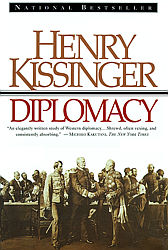
|
Diplomacy by Henry KissingerThe notorious US national security advisor and secretary of state writes a compelling book telling the story of US foreign policy. Whether you agree with him or not, his perspective and his unique access to the upper echelons of the world's most powerfu country are deeply insightful. What immediately caught me about this book is that it is extremely well-written. Kissinger is clear, reasonably concise and delivers a captivating commentary on world events and the diplomatic sphere. Not being very well-versed in the history of the US, I was fascinated not just by all the interactions between nations but also with the commentary of the inner workings of the US administration at the time. Importantly, Kissinger had the enviable position of being at the centre of one of the world's great powers during a time of great change. The insights into the way in which the world changed and adapted according to its great many wars, idealogical struggles and the resulting political situations is mesmerising (if you're into that sort of thing) and, whether you like Kissinger or not, I guarantee that you will definitely learn something from reading this book. Kissinger was awarded the Nobel prize for peace(!) in 1973. |

|
Understanding International Conflicts by Joseph NyeAn excellent companion to Kissinger's book, this wonderful book also works well as an entirely self-contained textbook on contemporary diplomacy. Nye, like Sachs, is another freak - summa cum laude from Princeton, a Rhodes Scholar etc. etc. He also writes very well. Considered one of the founders of neo-liberalism and the concept of "soft power" Nye speaks with great authority about various international conflicts and presents multiple views and approaches to analysing them. An invaluable book to build a knowledge base for understanding not just international conflicts, but international relations in general it is sometimes surprising how readable this book really is. The book is deceptively short - it is about a third the thickness of Kissinger's book. The pages are densely packed with information and insight and there was even space for maps. |

|
The Art of War by Sun TzuThis is a tricky book to read, mostly because you have to find a few different translations of it to really get the message clearly. Unfortunately, my chinese isn't good enough to read it in it's original chinese (although if anyone who can read chinese would like to read it to me, that would be great). Reading about warfare in the middle ages might seem counterintuitive to the cause of world peace, but the fact of the matter is that Sun Tzu's writing can be applied to a multitude of situations outside of warefare. Extremely succinct and slightly cryptic, this manual of warfare is a fount of wisdom in a way that you don't realise until long after you've finished reading it. It also makes you realise just how poorly we fight our wars these days. |

|
An Inquiry into the Nature and Causes of the Wealth of Nations by Adam SmithThe book and the author require no introdcution. Smith's 1776 masterpiece has been the centrepiece of economic theory for a very long time. I was surprised to learn that people undertaking commerce degrees at Melbourne University are never told to read this book. Everyone should read this book, especially the proponents of the "Washington Consensus". Being such a famous book, one reads it with many expectations. Most of those were met, but some were radically challenged. You see, the distillation and simplification of the information contained in this book means that, by the time you read about it in an economics textbook (which are, by the way, excellent solutions for insomnia) parts of the message are heavily distorted or just plain wrong. Smith writes about the world as he sees it, and he was a very observant man. The language may be difficult for some and this is certainly not an easy read. I wait with baited breath for a faithful translation into modern English (hopefully with pictures) of this book because everyone should read it. |

|
The Selfish Gene by Richard DawkinsHow can evolutionary biology on the genetic level possibly help us achieve world peace? It turns out that it may help a great deal. In fact, I was so impressed with the information presented in this book, that I now maintain that, if one wishes to train one's brain to think, one should study mathematics, but if one wishes to understand the way the world works, one should study economics and evolutionary biology. This book also gives us about the best insight to psychology that one can find. It is my contention that a majority of psychology studies are rubbish because they involve scientists who use statistics who don't have a good understanding of statistics. (This prejudice probably rose out of my first year stats classes which were populated by many dim-witted psychology majors... but I digress). Dawkins examines Darwinian natural selection at the level of the gene and he does it quite brilliantly. This is also an excellent starting point for the understanding of game theory and its results are derived from an experiment which has effectively been running for hundreds of millions of years. Douglass North said "all theorising in the social sciences builds, implicitly or explicitly, upon conceptions of human behaviour". As such, this is the best starting point for understanding that. |
Still to read...
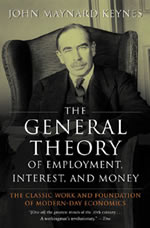
|
The General Theory of Employment, Interest, and Money by John Maynard Keynes |
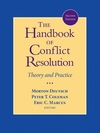
|
The Handbook of Conflict Resolution by Morton Deutsch |
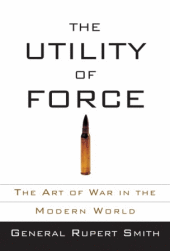
|
The Utility of Force by Rupert Smith |

|
The Wealth and Poverty of Nations by David Landes |
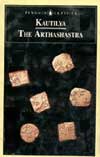
|
The Arthashastra by Kautilya |
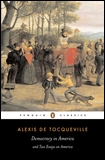
|
Democracy in America by Alexis de Tocqueville |

|
Fear of Freedom by Eric Fromm |
got a suggestion? contact me